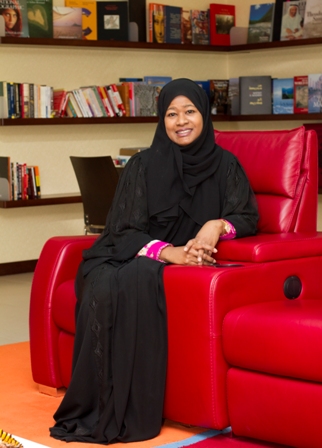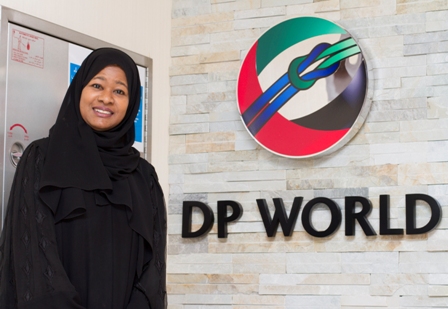“This is a time of change. More Emirati women are taking up positions on corporate boards, thanks to our Rulers who have facilitated the path for us,” Finance Director of DP World tells Joyce Njeri …

WELCOME MOVE: The debate about having women on companies’ boards is hugely welcome. However we should be careful and approach it in the perspective of merit and not be seen as a ‘token.’
IN HER office, overlooking the Sheikh Zayed Road at the Jebel Ali Free Zone in downtown Dubai, Mariam Al Rasasi offers me coffee as we settle down for this interview.
When I suggest that many Emirati women would dread to lead such a demanding, high profile finance role and would do anything to stay away, she retorts back quick in a flash: “This is a time of change. More women are taking up positions on major finance roles and on corporate boards, thanks to our Rulers who have facilitated the path for us.”
A US CPA-qualified accountant, Mariam is the Finance Director of DP World, a conglomerate of international marine terminal operations, logistics and related services. The Group is a subsidiary of Dubai World, a global holding company that focuses on the strategic growth areas of transport, logistics, drydocks, maritime, investment and financial services.
Mariam is today one of the most powerful Emirati women in finance in the country. She graduated from the UAE University in the early 90’s and joined the telecommunication company – Etisalat – as trainee in the finance department. She worked her way through the ranks to head the department, after which she moved to DP World as the Finance Director in 2007.
Suitably self-deprecating, yet straightforward, she offers an exclusive interview to Accountant Middle East in a candid manner, and it is not hard to discern why, as head of finance of DP World, her outspoken mode naturally gives a certain weight to her decisions. Here are the excerpts from the interview.
Recently, His Highness Sheikh Mohammed bin Rashid Al Maktoum announced that his government has made a decision to make the representation of women in companies’ boards compulsory. As the Finance Director of DP World what is your reaction to His Highness Sheikh Maktoum’s decree?
I wasn’t surprised when I heard about His Highness’ decision. I think the decree was very timely. Statistics show that women graduates outnumber men by a ratio of two to one, and therefore we don’t want to risk wasting the talents of another generation of women and leaving the board rooms of UAE organisations without the diversity of skills, talents and experiences.
The debate about having women on companies’ boards is hugely welcome. Past studies have shown overwhelming evidence that having women on boards, in leadership teams is good for business as it enriches decision making, enhances innovation and this will eventually make the UAE more competitive in the future. However we should be careful and approach it in the perspective of merit and not be seen as a ‘token.’
Change is occurring, but it is slow and the UAE boasts many talented, qualified and experienced women seeking and waiting to serve on boards. There are some organisations which have already started implementing His Highness’ directive, albeit on a smaller scale. This may have some drawbacks as boards that have never had a female director may invariably appoint a lone female which may lead to feeling of isolation and a sense of being seen as ‘a token’.
What can organisations do to prepare high-achieving women in their companies for senior roles and board positions?
If a company really wants to attract and retain top female talent, it must make more effort in the area of professional development. For this to happen women need to be equipped with the skills and experience to make them “board ready”.
Achieving balanced boards requires a pipeline of women progressing through the ranks and therefore organisations need to develop a culture which recognises diverse talent and values different models of leadership. Companies should make serious interventions by introducing a range of innovative and flexible work options for women.
As I mentioned earlier, greater gender balance in boards can help companies improve their organisational performance and operating results, however, there are companies that still have policies that discourage women from rising to leadership positions. Therefore companies looking to achieve a greater gender balance need to make serious interventions by introducing a range of innovative and flexible work options for women and make themselves more female-friendly in terms of work environment, workplace culture and benefits.
How has women’s leadership roles evolved in the past couple of decades and what challenges remain?
Historically, in the UAE, as is in many other countries, leadership has carried the notion of masculinity and the belief that men make better leaders than women is still common today. Women continue to aspire for leadership positions in all spheres of governance in both the government and private sector, however it has not been easy as many barriers still remain. These may be related to stereotypes, culture and cultural expectations, the choice and balance between work and family.
Traditional beliefs and cultural attitudes regarding the role and status of women in society are still prevalent. Therefore, gender quotas, affirmative action, mentorship programmes and financial assistance should be deployed to boost women’s participation in all spheres of workplaces.
What in your view, is important and should be done further in order to get women better represented on boards?

ATTRACTING TALENT: Companies should make serious interventions by introducing a range of innovative and flexible work options for women.
It needs to start with women themselves. Many common explanations for why women don’t hold advanced positions within companies include reasons such as a lack of commitment, lack of ambition or leaving work to care for family. We need to rise above this and demonstrate that we can juggle all these responsibilities. Of course we all want to be able to have balance in our lives. We want to rise to the top, but we don’t want to give up every other component of our lives to do it.
Serving on the boards of organisations can sometime be hectic, owing to characteristics such as excessive travel, working beyond contract hours among others. Do you think these facts act as an impediment to many women with the motivation and ambition to reach top-level management positions? What in your opinion is the biggest hindrance or barriers to women’s progression to the highest echelons of the corporate world?
Women’s progression in the top ranks of companies is increasing although some barriers still remain, including the more insidious organisational culture, which maintains workplace inequalities through institutional practices. If we are to move the dial in the right direction and increase the number of women in senior roles within our organisations, then these need to be revised.
At the same time, women see balancing work and family as the biggest barrier. As a society and an advanced economy, I believe it is vital that we find a way of better allowing individuals to raise families and fully participate in the workplace.
Is there any advice you can give to women who want to advance as leaders? Any key points to focus on?
The earlier you start with clear career development plan the better for your future growth, you must define your strength and always work to improve on your weak areas. Never stop exploring … and always maintain important professional networks.
In your opinion, what can facilitate the path to the top of the corporation for women?
While it’s not a new thing in the UAE to have women serving on boards, more needs to be done in order to have Sheikh Mohammed’s decree followed to the letter. First and foremost, this will require a significant shift in corporate culture and in the attitudes and behaviours of many towards the modern women.
People tend to over-play the challenge of a quota system and under estimate the benefits of change that doing something different can bring. Gender representation offers benefits like improved board governance, brings together directors with different perspectives, a deeper talent pool and a more engaged leadership team.
What do you enjoy most about serving on the Board of DP World?
I enjoy being part of very dynamic team where the learning never stops, we are continuously working towards implementing new initiatives, devising fresh strategies and afterwards celebrating that feeling of satisfaction when we see our dreams come true.












